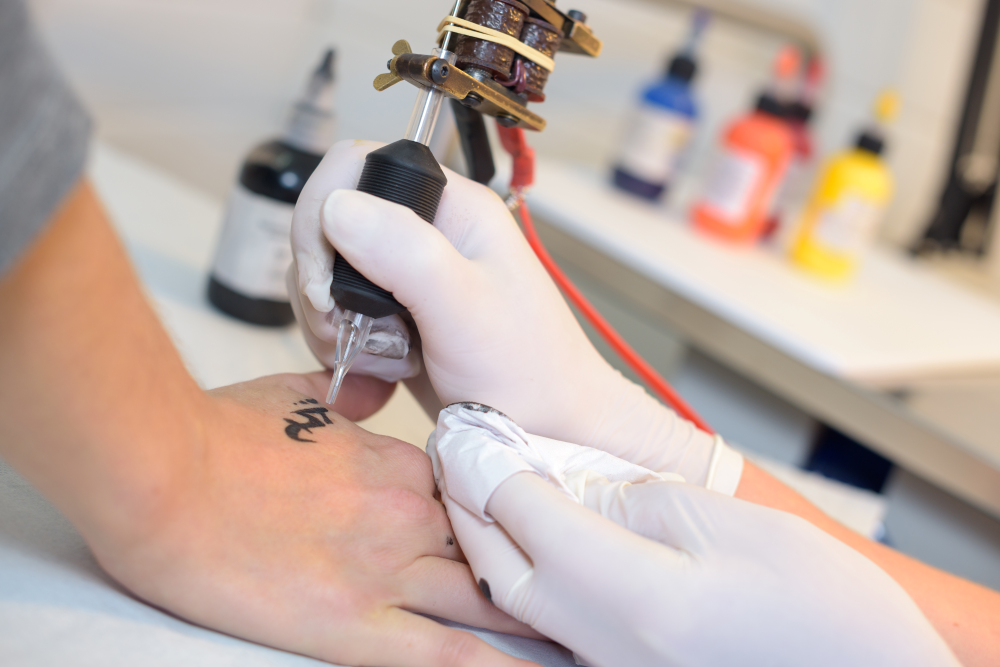Tattoos are a popular form of self-expression and creativity. Unfortunately, some people experience unexpected skin reactions to tattoos. According to Dr. Jade Fettig of U.S. Dermatology Partners Denver, “For most people, tattoos heal without complications. However, some people do experience allergic reactions, infections, and other skin reactions following tattoos. Knowing how to identify these issues early and seek appropriate treatment is crucial for maintaining both the appearance of your tattoo and your overall skin health.” In this blog, Dr. Fettig explores common skin reactions to tattoos as well as prevention and treatment options.
Common Tattoo Skin Reactions & Their Causes
In order to prevent common skin reactions to tattoos and receive treatment as soon as possible, it’s important to understand common, adverse skin responses. According to Dr. Fettig, “Understanding common tattoo skin reactions, causes, symptoms, and treatments before investing in a tattoo is essential to ensure you seek the right dermatologic treatment if necessary. This awareness also allows you to take preventive steps to avoid skin reactions.” Below, we discuss the most common tattoo skin reactions, symptoms, causes, and treatments:
Allergic Reactions
Allergic reaction to tattoos is the most common adverse skin reaction. Allergic skin response may be addressed at home or in conjunction with dermatologic care, but any allergy symptoms should be addressed to prevent more serious concerns.
Symptoms:
- Itching, swelling, hives, or a rash at and around the tattoo site.
- Redness and irritation, sometimes spreading beyond the tattoo.
- Persistent discomfort, itching, or a burning sensation.
Commonly Affected Ink Colors:
- Red ink is the most common culprit for allergic response to tattoos, often due to mercury sulfide (cinnabar) used to achieve red coloring.
- Yellow, green, and blue inks may also cause reactions due to metallic components like chromium or cobalt.
Treatment:
- Mild reaction – over-the-counter antihistamines (e.g., Zyrtec) and topical corticosteroid creams typically alleviate a mild allergic response.
- Severe cases – may require dermatologist-prescribed oral or topical medications, including corticosteroids.
Resolution:
- Most allergic reactions following tattoos subside within a few weeks or months, but some may persist or recur with repeat tattooing.
Infections
Infection is another common adverse skin response that occurs following tattooing. Skin infection may occur in a variety of situations, and it has a range of adverse effects on the skin and the whole body.
Causes:
- Contaminated inks or water.
- Poorly sterilized or unsterilized tattooing equipment.
- Improper aftercare, such as failing to clean the tattoo properly.
Symptoms:
- Redness, swelling, warmth, and pain around the tattooed area.
- Pus or fluid drainage.
- Blisters or open sores.
- Fever and chills (indicating a systemic infection).
When to See a Dermatologist:
- Redness spreads beyond the tattoo site.
- You develop a fever or chills.
- Pus or open sores do persist.
Tattoo Infection Treatment Options:
- Antibiotics may be prescribed for bacterial infections.
- Drainage procedures may be performed on abscesses.
Skin Conditions Triggered by Tattoos
Those who experience chronic skin conditions like eczema and psoriasis or who have a family history of irregular scarring may be more likely to experience adverse skin reactions after receiving a tattoo.
Eczema & Psoriasis Flares:
Some individuals with eczema or psoriasis may experience flare-ups in tattooed areas.
Treatment:
- Moisturizers.
- Topical steroids.
- Dermatologist-prescribed medications.
Keloids (Thick Scarring):
Keloids are a form of scarring that causes large, protruding growths from injured areas. If you’re prone to keloids, tattooing may trigger an overgrowth of scar tissue.
Treatment:
- Corticosteroid injections.
- Laser therapy.
- Surgical removal (for severe cases).
Rare but Serious Tattoo Reactions
According to Dr. Fettig, “Most tattoo reactions are mild, but there are some skin reactions that are much more serious. It’s important to recognize these skin reactions and seek treatment right away.” Rare but serious tattoo skin reactions include:
- Photoallergic dermatitis – some tattoo pigments react to sunlight, causing skin redness, itching, and irritation.
- Granulomatous reactions – small, firm bumps develop around skin tattooed with certain pigments, particularly green or blue ink.
- Lichenoid reactions – resemble flat, itchy rashes and are linked to metal-based tattoo inks.
- Pseudo lymphomatous reactions – a delayed immune response leading to swollen, inflamed patches of skin in the tattooed area.
When to See a Dermatologist
It’s important to see a dermatologist if:
- Your tattoo reaction does not improve within a few weeks.
- You experience persistent pain, itching, or swelling.
- You show signs of infection (e.g., pus, fever, spreading redness).
- You suspect a delayed allergic reaction, which can appear months or even years later.
Treatment Options for Tattoo Reactions
When it comes to treatment options, Dr. Fettig says, “The severity of skin reactions following tattoos determines what treatment is recommended. The sooner treatment starts, the more likely your dermatologist is to address concerns with simple solutions. More severe reactions mean a greater potential for long-term damage, and this may require more advanced treatment options.” Below, Dr. Fettig outlines treatment recommendations for mild and moderate to severe skin reactions following tattooing:
Mild Reactions
- Topical corticosteroids (prescription or over-the-counter) may be used to alleviate itching and inflammation.
- Oral antihistamines for allergic reactions.
Moderate to Severe Reactions
- Oral or injectable corticosteroids for persistent inflammation.
- Antibiotics for infections.
- Laser tattoo removal (for chronic allergic reactions or granulomas).
How to Prevent Tattoo Reactions
Reactions may not always be preventable, but there are some steps you can take to reduce the risk of tattoo skin reaction, including:
- Choose a reputable tattoo artist who follows strict hygiene practices.
- Ask about the ink ingredients, especially if you have sensitive skin or allergies.
- Follow proper aftercare to reduce infection risk.
- Test a small patch of skin before getting a large tattoo.
- Understand that tattoos can exacerbate certain skin conditions such as keloids and psoriasis.
Know the Risks Before You Commit
When it comes to the importance of understanding potential tattoo risks, Dr. Fettig says, “Tattoo reactions are common and range from mild irritation to serious, but if you know the risks, you can work to reduce the severity of adverse effects. If you do experience unusual symptoms, consult a dermatologist for expert care.”
Talk to a Dermatologist About Potential Tattoo Skin Reactions
If your tattoo is causing persistent skin problems, you might consider laser tattoo removal or other more advanced treatment options. If you’re experiencing a tattoo-related skin reaction, don’t wait. Seek professional help to ensure proper treatment and prevent complications. To schedule a consultation at U.S. Dermatology Partners, take a few moments to complete the online scheduling request form. A local team member will be in touch soon.
Find a location near me
or


